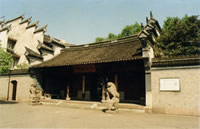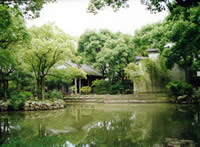|

Tianyi Pavilion Library is situated beside the Moon Lake in west Ningbo City. The library, which has survived 430 years of dramas and upheavals, is the oldest existing private library of China and Asia, and one of the world's three oldest libraries kept by a family. For centuries it has been reputed to be the "city of books in South China" for its giant collection of highly-valued ancient books and documents. For those men of letters traveling to Ningbo, a trip to its Tianyi Pavilion has always been a craved experience. However, during the past several hundred years, the library used to be the private property of the Fan family, an absolutely restricted neighborhood. As a result no more than twenty visitors could have a privilege to step into the premises during the past several hundred years. Today Tianyi Pavilion is a vault chosen by the State government to deposit Ningbo's private bibliotheca. It is open to the public too so that experts and scholars can finally have access to their most coveted archives right in the library, rare documents buried under centuries of dust. This can be called "the modern use of the old times". In 1982, the State Council made Tianyi Pavilion one of the country's key cultural heritages, thus turning the library into an indispensable landmark in this city famous for its remarkable historical culture, a star of civilization in which Ningbo people take great pride.

Tianyi Pavilion Library deserves to be called a wonder in the history of libraries in China and Fan Qin the founder of Tianyi Pavilion is the creator of the wonder. Fan Qin, the owner of Tianyi Pavilion was born in Yinxian County and lived during the reign of Emperor Jiajing of the Ming Dynasty. In 1532 when he was 27 years old, Fan passed the highest imperial examination and earned the title of jinshi--successful candidate in the examination. After that he served as an imperial governor in many places of China, where he accumulated diverse experiences and made impressive achievements. In 1560 when he turned 55 and was weary of politics, Fan Qin resigned as senior minister of the Ministry of War and returned to his hometown. With remarkable ingenuity he had a house built beside Ningbo's Moon Lake to store his books. Borrowing an idea from The Book of Changessuggested in "Heaven embodied in One gives birth to water, while Earth represented in Six makes it grow", Fan Qin named the new house "Tianyi Pavilion" (that is "Pavilion of Heaven and One"). Books are most vulnerable to fire, he said, but water can suppress fire. Thus the name "Tianyi" hints at the fact that water curbs fire and in this way Fan Qin hoped his stock might for ever be clear of the destructive might of flames. He also wedged the idea into the structure of the library, where one large room constitutes the upper floor, suggesting "Heaven joined with one gives birth to water", whereas downstairs there are six chambers, alluding to the message "Earth coupled with six makes it thrive". Besides he had a pond dug in front of the house, a reservoir in case of fire. There is always water in the pond, even during grave droughts, for it is connected with the Moon Lake on its east side. Thus a similar name "Tianyi Pond". Even the bookcases in the house were made in such sizes that they correspond to the idea of six and one. Indeed everything in the library is evidence of the owner's clever designing.
Fan Qin had a born passion for books. During the years he served as a governor in various provinces he made great efforts in buying books. He did not stop such attempts even after he returned home upon resignation. However unlike his elder and contemporary bibliophiles, Fan Qin did not spend his fortune on the best Song Dynasty editions, rare copies or secretly distributed books, those craved by most book collectors. Instead, he concentrated on local chronicles, records about jinshiin various dynasties and contemporary anthologies, objects spurned by ordinary collectors. Fan Qin was therefore said to be a bit "silly". Many years of gathering, copy work and donations from friends finally turned Fan Qin's stock into a dimension of over 70 thousand volumes. Although only 17 thousand of this number remain in today's Fan Qin library, its local chronicles of the Ming Dynasty and the rolls of jinshiturn out to be its most outstanding and largest portion. 65% of the library's 271 local chronicles and 90% of its 370 rolls of jinshiare the only copies extant in the country. Safely preserved at Tianyi Pavilion now, these are priceless treasures for researchers of Chinese traditional culture.
Suggested Itinerary
West Gate--Embossed Sculpture--Dongming's Lodge--Baoshu House--Zunjing Pavilion, Stone Tablet Collection, Chamber of Thousand Jins--East Garden--Lotus Island--Tributary Ancestral House of the Qin Family--House of Drawings and Calligraphic Works--South Garden. |